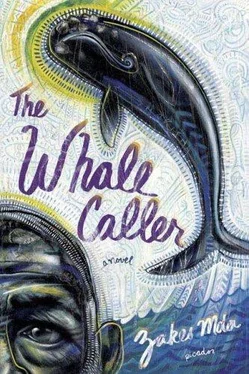The Whale Caller can now hear his song very clearly: Softly a serenade, whispers I love you, Santa Lucia, Sa-a-anta-a-a-a-a Lucia-a-a-a-a. It is a boy’s voice, and has not yet broken. Yet it is so canorous that it lifts the Whale Caller to his feet. He applauds and shouts: “Bravo! Bravo!”
Unlike the Bored Twins, whose voices are those of angels, Saluni explains, Lunga Tubu’s voice is of this earth. It is a voice of a humble twelve-year-old boy from Zwelihle Township who comes down to the sea on weekends and public holidays to sing for his supper.
It seems to the Whale Caller that Saluni’s influence has now made him hear the songs of humans as well. It has also made him see things that he has never noticed before, although they have been around him all the time.
The head waiter appears on the portico and shoos Lunga Tubu away. But the boy continues his song. Saluni has seen this ritual many times before and finds it quite funny. The Whale Caller, on the other hand, is disgusted that a boy with such a pleasant voice is being driven away so unceremoniously.
“He says the boy steals his tips,” explains Saluni.
“But the boy didn’t even get within ten metres of the restaurant. Does he think the poor boy has long invisible hands?”
“He thinks that if the tourists didn’t have to throw some coins at Lunga he and the other waiters would be getting bigger tips.”
The head waiter disappears into the kitchen and returns with a fat man who is either the owner or the manager of the restaurant. The man walks down the wooden steps on the side of the portico, shouting abuse at Lunga Tubu. He picks up pebbles and throws them at the boy, who is now running away.
“Run this way, Lunga, he won’t dare come to bother you here,” shouts Saluni.
The boy runs to the green bench. He is tiny and emaciated.
“What did you do to that man?” asks the Whale Caller.
“Nothing,” says the boy. “He doesn’t want me to sing near his restaurant.”
Saluni explains to the Whale Caller that Lunga Tubu’s presence here destabilises the serenity of Hermanus — a sanctified playground of the rich. Lunga Tubu is disturbing the peace of the world. His tiny frame nags the delicate souls with what they would rather forget: that only a few kilometres away there is another world that is not at peace with itself — a whole festering world of the disillusioned, those who have no stake in the much-talked-about black economic empowerment, which is really the issue of the black middle class rather than of people like Lunga Tubu. While the town of Hermanus is raking in fortunes from tourism, the mothers and fathers of Zwelihle are unemployed. It is a world where people have lost all faith in politicians. Once, they had dreams, but they have seen politicians and trade union leaders become overnight millionaires instead. Only tiny crumbs trickle down to what used to be called “the masses” in the heyday of the revolution.
Of course only a liar can claim that things are as bad as they were during the days of apartheid, Saluni is emphatic about this. More people have been housed than ever before. Even shacks in informal settlements here and in the inland provinces have been electrified. Services such as telephones and water have been provided even in the remote villages. But in a country with such high unemployment, this has come with new problems. People are unable to pay for these services.
One little “empowerment” that exists in Zwelihle is the indigent tariff. Poor families that qualify for this tariff are relieved of paying for utilities and municipal services. But the city fathers and mothers are quick to disqualify a family as soon as it owns a fridge, a geyser or some other appliance that may be deemed a luxury. If they can afford a fridge, common wisdom dictates, they can afford to pay their utilities bills. The inspectors of the municipality discovered once that Lunga Tubu’s family owned a range of electrical appliances and gadgets. The family was immediately disqualified from the indigent tariff. It did not matter to the bureaucrats that these appliances were hand-me-downs from his mother’s employer in “the kitchens.” Hence he has to sing, not only for his supper and his fees at Lukhanyo Primary School, where he is doing Grade Six, but for service arrears as well. And this is the most crucial of his expenses. Many citizens of Zwelihle have had their houses auctioned away because of service arrears.
“There is no place you do not know in Hermanus, Saluni,” observes the Whale Caller. He is obviously quite impressed by her command of the politics of Hermanus. “There is nothing you don’t know in this district.”
“People in the taverns talk,” says Saluni. “And I have been to every tavern worth its name in the district. Until you came along.”
“You came along.”
“You searched for me.”
The Whale Caller studies the tiny boy in front of him. The boy is grinning expectantly.
“You sing well, boy,” says the Whale Caller. “What do you want to be when you grow up?”
“A whale caller,” says Saluni impishly.
“An opera singer,” replies the boy.
And he is determined to be one, whatever obstacles may be put in his way. He sings in a school choir. But one day he will surpass his heroes: Luciano Pavarotti, Plácido Domingo and José Carreras. He then rattles off the history of the three tenors, and tells the Whale Caller about some of their great concerts. The Whale Caller himself has never been one for music, except the songs of the whales.
Lunga Tubu breaks into a rendition of “O sole mio,” and then follows it with “La donna è mobile” There are tears in the Whale Caller’s eyes. Saluni looks at him, shakes her head and smiles.
“That is very sweet,” she says.
The Whale Caller is clearly offended. He gives Lunga Tubu some banknotes without even counting them and abruptly walks away.
“Hey, what’s wrong now?” asks Saluni, running after the Whale Caller. “It is okay, man, you can cry.”
The whales have been gone for many months, and the taverns of Hermanus miss their love child. She has been gone for almost as long as the whales. Many rumours circulate, ranging from the mundane to the sublime. She stowed away in an oil tanker. She was seen at the Cape Town docks drinking with a bunch of Mediterranean seafaring types who took a fancy to her and persuaded her to sail the world with them, smuggling crude to third-world countries with black-market economies. She is hibernating with a new rash after the Bored Twins placed ten hairy millipedes in her bra — five in each cup. Others saw her in conference with a bevy of water maids — beautiful women with lower bodies of fish — in the deep of the night. She has joined them in their undersea queendom. She is in the process of metamorphosing into a watermaid.
These stories change every day, like the story of her own conception: one day she is seen riding on the back of a dolphin which swims with her to the horizon, and the next day she has joined a cloister of nuns and has taken the vow of chastity, or has been discovered by a talent scout and now she sings the blues on a cruise liner.
There are those who know a different truth. They are the very few who have found reason to venture to the beaches, to Walker Bay and the Old Harbour — areas often shunned by the true-blooded citizens of Hermanus as being too touristy. They have seen Saluni, they claim, waltzing in the morning with a strange man who blows a kelp horn for the whales. No, not Wilson Salukazana the whale crier from Zwelihle, who is employed by the town council to alert whale watchers as to the presence and location of whales. Everyone knows the whale crier. He has been seen in newspapers and on television. Everyone in the world who has a camera has photographed him. The whale man seen with Saluni is a different one, the bald brawny silver-bearded man in blue dungarees or black tie who does not relish an audience when he blows his horn, but merely tolerates it because there is nothing he can do about it. The one who calls whales to himself and spends the nights dancing with them. Saluni is often seen with him. Loitering on the beach like the strandlopers of old. Strolling down supermarket aisles. Smiling broadly. Sometimes even holding hands! Yes, the very Saluni that they thought they knew so well! The love child.
Читать дальше












